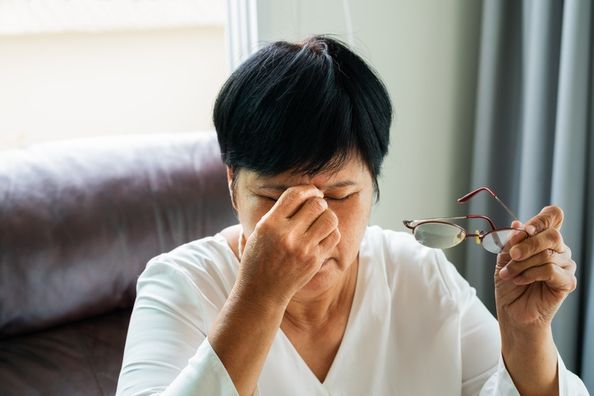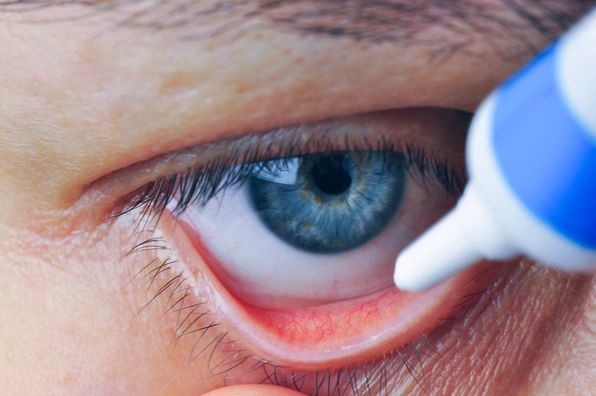Feel like you’re spinning when you’re standing? Or do you hear ringing or a roaring sound when it’s quiet? You have have an inner ear issue called Ménière’s disease. Learn more below!
What causes Ménière’s disease?
The symptoms of Ménière’s disease are associated with a change in fluid volume within a portion of the inner ear known as the labyrinth. The labyrinth has two parts: the bony labyrinth and the membranous labyrinth. The membranous labyrinth, which is encased by bone, is necessary for hearing and balance and is filled with a fluid called endolymph. When your head moves, endolymph moves, causing nerve receptors in the membranous labyrinth to send signals to the brain about the body’s motion. An increase in endolymph, however, can cause the membranous labyrinth to balloon or dilate, a condition known as endolymphatic hydrops.
Many experts on Ménière’s disease think that a rupture of the membranous labyrinth allows the endolymph to mix with perilymph, another inner ear fluid that occupies the space between the membranous labyrinth and the bony inner ear. This mixing, scientists believe, can cause the symptoms of Ménière’s disease. Scientists are investigating several possible causes of the disease, including environmental factors, such as noise pollution and viral infections, as well as biological factors.
What are the symptoms of Ménière’s disease?
The symptoms of Ménière’s disease occur suddenly and can arise daily or as infrequently as once a year. Vertigo, often the most debilitating symptom of Ménière’s disease, typically involves a whirling dizziness that forces the sufferer to lie down. Vertigo attacks can lead to severe nausea, vomiting, and sweating and often come with little or no warning.
Some individuals with Ménière’s disease have attacks that start with tinnitus (ear noises), a loss of hearing, or a full feeling or pressure in the affected ear. It is important to remember that all of these symptoms are unpredictable. Typically, the attack is characterized by a combination of vertigo, tinnitus, and hearing loss lasting several hours. People experience these discomforts at varying frequencies, durations, and intensities. Some may feel slight vertigo a few times a year. Others may be occasionally disturbed by intense, uncontrollable tinnitus while sleeping. Ménière’s disease sufferers may also notice a hearing loss and feel unsteady all day long for prolonged periods. Other occasional symptoms of Ménière’s disease include headaches, abdominal discomfort, and diarrhea. A person’s hearing tends to recover between attacks but over time becomes worse.
How is Ménière’s disease diagnosed?
Through the use of several types of hearing tests, physicians can characterize hearing loss as being sensory, arising from the inner ear, or neural, arising from the hearing nerve. Recording the auditory brain stem response, which measures electrical activity in the hearing nerve and brain stem, is useful in differentiating between these two types of hearing loss. Electrocochleography, recording the electrical activity of the inner ear in response to sound, helps confirm the diagnosis.
To test the vestibular or balance system, physicians irrigate the ears with warm and cool water or air. This procedure, known as caloric testing, results in nystagmus: rapid eye movements that can help a physician analyze a balance disorder. Since tumor growth can produce symptoms similar to Ménière’s disease, an MRI is a useful test to determine whether a tumor is causing the patient’s vertigo and hearing loss.
How is Ménière’s disease treated?
There is no cure for Ménière’s disease; however, the symptoms of the disease are often controlled successfully by reducing the body’s retention of fluids through dietary changes (such as a low-salt or salt-free diet and no caffeine or alcohol) or medication. Changes in medications that either control allergies or improve blood circulation in the inner ear may help. Eliminating tobacco use and reducing stress levels are more ways some people can lessen the severity of their symptoms.
Different surgical procedures have been advocated for patients with persistent, debilitating vertigo from Ménière’s disease. Labyrinthectomy (removal of the inner ear sense organ) can effectively control vertigo, but sacrifices hearing and is reserved for patients with nonfunctional hearing in the affected ear. Vestibular neurectomy, selectively severing a nerve from the affected inner ear organ, usually controls the vertigo while preserving hearing, but carries surgical risks. Recently, the administration of the ototoxic antibiotic, gentamycin directly into the middle ear space has gained popularity worldwide for the control of the vertigo of Ménière’s disease.
Health Topics:







